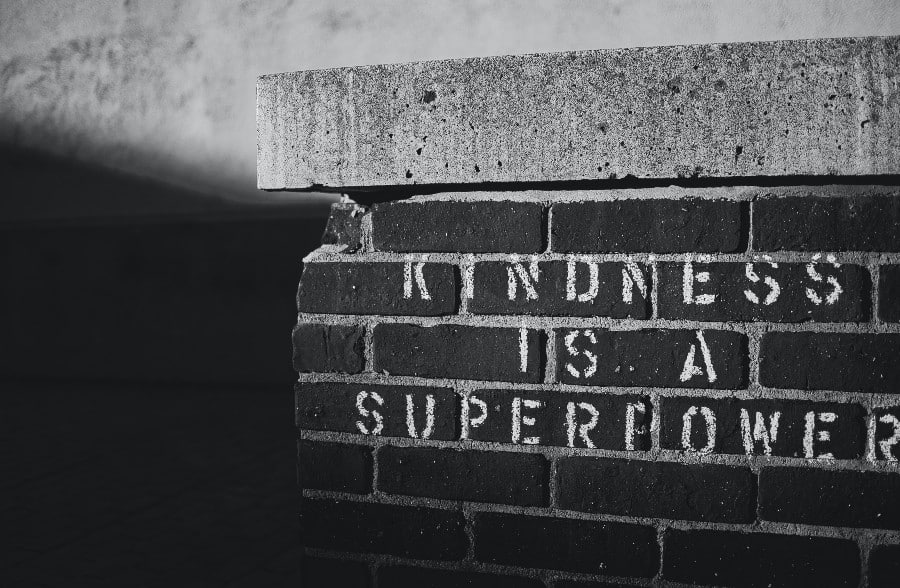Given that World Kindness Day was celebrated earlier this month, now seems a good time to talk about the results of a very large and exciting public science project; the world’s largest in-depth study on kindness to date. The Kindness Test was commissioned by BBC Radio 4 in conjunction with a team from the University of Sussex, led by our brilliant former podcast guest, Professor Robin Banerjee.
A whopping 60,000 people aged 18-99, from 144 different countries, filled out a detailed online questionnaire. It aimed to explore different people’s attitudes towards and experiences of kindness and how these might relate to health and wellbeing. The questionnaire sought to establish the most common kind acts, barriers to behaving more kindly, levels of kindness in the workplace and how kindness is connected with compassion, empathy and our value systems. BBC Radio 4 broadcaster and Visiting Professor of the Public Understanding of Psychology at the University of Sussex, Claudia Hammond, worked on the project and presented its findings on Radio 4 earlier this year.
Even before this study, we already knew that kindness has far-reaching psychological and social consequences.
There was already a solid evidence base showing that practising kindness has a positive impact on our mental health, as well as educational and interpersonal benefits. Research has shown that kindness is linked to higher levels of life satisfaction, positive emotions and subjective happiness. Studies show that kindness in children can facilitate better educational processes and outcomes and is positively linked to behavioural, academic and emotional motivation, and engagement at school.
So, what did The Kindness Test add? We’ve outlined the key findings:
1. Kindness is everywhere.
Despite the doom, gloom and negativity that pervades the news, we should take heart in the fact that kindness is extremely common in people of all ages and locations. Three-quarters of respondents said that they received kindness from friends or family either ‘quite often’ or ‘nearly all the time’. 16% of people said that someone had been kind to them within the last hour, and a further 43% said that they had received kindness within the last day. Two-thirds of people in the UK thought that the pandemic made us kinder. Interestingly, only just over one-third of American respondents thought the same.
2. Everyday kindnesses, whether or not we know the person, are meaningful.
Kindness comes in many forms and, more often than not, is not about big gestures. Making a friend or loved one a cup of tea, holding the door open for another person, picking something up off the floor for a stranger, or smiling at someone in the street, all make a difference. Respondents reported that most acts of kindness take place at home, followed by medical settings, the workplace, green spaces and shops. Fewer kind acts were seen online, on public transport or in the street. The study actually showed that the more we talk to people who we don’t know, the more kindness we receive, and the more kindness we notice going on around us. The most commonly reported act of kindness was helping people when they asked.
3. The main barrier to kindness is a concern that the act could be misinterpreted.
According to Professor Banerjee, this worry (reported by 66% of people) isn’t actually well-founded, and any opportunities to be kind should be seized. 57% of people said that they didn’t have as much time as they’d like to be as kind and 52% reported that social media played a part in stopping them from being kinder. Sadly, 28% said that they felt kindness would be seen as a weakness.
4. Women, religious and older people tend to carry out more acts of kindness.
Interestingly, women reported seeing kindness, receiving kindness and being kind, more frequently than men. Religious people and older people also said that they donated more of their money and time to charity. Interestingly, people’s level of earnings had no correlation with reports of generosity. When asked what they’d do with an unexpected windfall of £850, people on the lowest incomes and the highest incomes both tended to say they’d give away the least.
5. Personality type impacts on how much kindness we give and receive.
The Kindness Test included a personality scale. The kindest people were also more likely to be extroverted, agreeable and open. It’s important to note though that these results are averages. Individuals who are quiet, or who aren’t keen on new experiences, can still be very kind!
6. Kindness is linked to wellbeing.
This comes as no surprise to us, but The Kindness Test provides more evidence. Being kind, noticing kindness and receiving kindness all impact positively on our wellbeing, making us feel good.
If you are interested to find out more about the results of The Kindness Test, Claudia Hammond’s new book, The Keys to Kindness: How to be Kinder to Yourself, Others and the World, is out now.
At Tooled Up, we were already convinced of the benefits of kindness. That’s why our resource library already features a whole section of resources devoted to promoting kindness, including interviews with leading researchers in this field, family fundraising ideas, a 100 acts of kindness activity (which includes prompts for kindness online) and a list of books that can help to cultivate kindness and empathy. Tooled Up subscribers can access all of them now!
If your school or organisation doesn’t currently subscribe to Tooled Up, but you’d like to, please get in touch.





